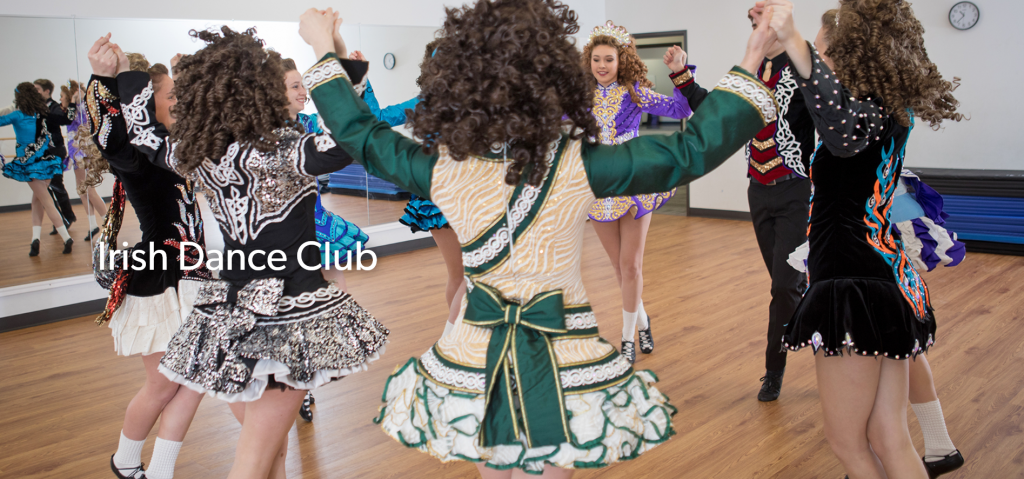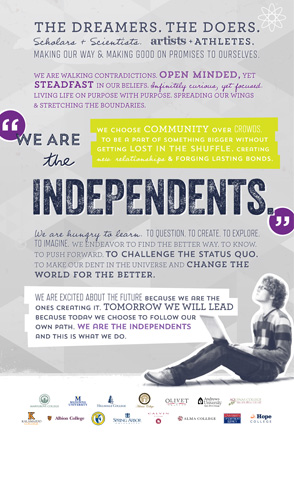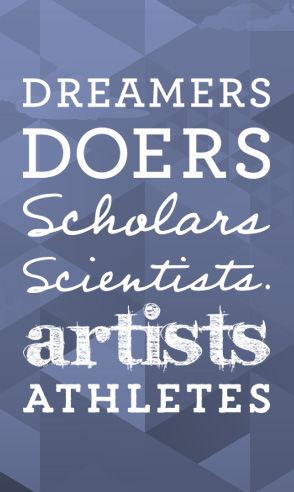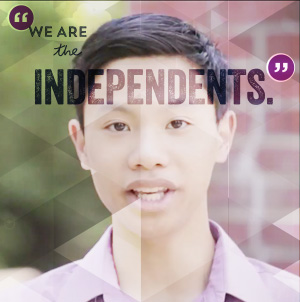Blog - Category: scholarship
Albion College Announces The ‘Michigan 2020 Promise’ Scholarship Exclusive To The Incoming Fall Class
No one should forgo education as a result of heightened financial duress stemming from the COVID-19 pandemic. That’s why Albion College announced a new and substantial scholarship program – the Michigan 2020 Promise.
This scholarship will assist Michigan families who have college affordability concerns due to COVID-19. Exclusive to graduating high school seniors and transfer students, the Michigan 2020 Promise will cover 100% of tuition and fees for Michigan students’ whose families make under $65,000 annually, after the Michigan Tuition and Federal Pell grants are applied. Families making over $65,000 at minimum will receive $92,000, or as high as $136,000 in Albion College scholarships over the course of 4 years.
“The COVID-19 pandemic has not only denied graduating seniors with the opportunity to walk in a high school graduation ceremony, it has evoked anxiety and concern for the financial and educational future of Michigan families,” said Dr. Mauri Ditzler, President of Albion College. “Now more than ever, Albion College is committed to making higher learning accessible through this substantial scholarship, waived entrance exams and unrivaled value. Even in the face of uncertainty, Albion provides the hope, help and resources to empower Michigan students and families to reclaim ownership of their educational future, and the power to make quality, life-advancing decisions on their own terms.”
The program is a testament of Albion’s incredibly generous alumni, loyal donors and board of trustees. In fact, the Michigan 2020 Promise was made possible by a single, benevolent donor whose gift inspired the decision to offer the Class of 2020 this support.
In the wake of the COVID-19 pandemic, entrance exam testing dates were postponed to the fall. To lessen this undue stress and make the hope of higher education more readily attainable, Albion College will also be waiving ACT and SAT scores as a prerequisite for admissions—exclusive to the fall 2020 incoming class.
The opportunity to apply for a Michigan 2020 Promise scholarship expires on May 1.
Visit albion.edu/MI20promise for more details!
The Places You’ll Go: Greenhalgh Gift Opens Travel Possibilities to More Albion College Students
There is an incredible world out there ready to be explored and experienced for the college student willing and eager to find it. And nothing should stand in their way. The new Albion College Stephen I., ’74, and Susan Brochu Greenhalgh, ’75, Endowed Student Experience Fund will help make that happen. The $250,000 gift will support travel costs for students with financial need who wish to participate in faculty-sponsored academic trips.
“The stigma that attaches to students who can’t go because of financial issues, that bothered me,” said Greenhalgh, a Pontiac native who earned his bachelor’s degrees at Albion in anthropology and sociology, then earned his law degree from Washington & Lee University in Virginia in 1977. “Other students would come back to class and talk about their experiences and there were students who couldn’t go. I thought the stigma was very unfortunate.”
The gift is intended for travel only when a faculty member is present and purely for academic purposes. It should benefit multiple students each year.
Now retired and living in Boulder, Colo., after a career with the Bodman Law Firm in Detroit (where he was a corporate attorney for the Detroit Lions among other clients), Greenhalgh was first intrigued by the idea of helping deserving students on faculty-sponsored travel several years ago after talking with Albion religious studies Professor Jocelyn McWhirter, who for years has sponsored the biennial Holocaust Studies Service-Learning Project trip to Poland.
But there were other faculty-student events as well, including First-Year Seminar trips and the yearly excursion for the Center for Sustainability and the Environment, Greenhalgh noted.
“There were students who were missing out,” he said.
When McWhirter learned what the Greenhalghs were working on to help these students, she was pleased.
“It broadens their horizons,” she said. “I think these trips take students into an unfamiliar world. And when they enter an unfamiliar world, whether it’s in the U.S. or a destination outside the U.S, I think it gives them a new perspective on the world. It fosters skills of adjusting to another culture, adjusting to how to move within another culture, even learning a strange language. I think in the case of my trip, and other trips, it introduces students to new people and new history.”
And that’s exactly what the Greenhalghs were hoping for with this fund.
“This does two things,” said Greenhalgh, who has also served for 11 years as a member of the College’s Board of Trustees. “It helps the faculty and it provides more immediate opportunities for students from less affluent families. And I hope it provides life experiences by going to places like Europe and Africa for students who otherwise might not have that opportunity. It all falls under the rubric of experiential learning, and I believe that experiential learning can make all the difference in a liberal arts education.”
And not only will the new gift sustain current travel projects, it could lead to opportunities for more trips to different areas for more students.
“It’s great for students who don’t have the money,” McWhirter said. “These trips are an experience that can’t be had by staying where you are.”
Irish Dance and Culture at Aquinas College
Aquinas College loves Irish culture! Since the early ’70s, Aquinas has embraced Ireland. As the only college in Michigan to offer an Irish Studies minor, Aquinas’ interdisciplinary program offers a comprehensive understanding of Irish culture in both historical and contemporary contexts. For more than 40 years, students and faculty have studied in Tully Cross, Ireland, to gain a unique perspective of Irish history and culture. And new in fall 2018, Aquinas students can now join the only Michigan collegiate Irish Dance Club to offer scholarships to dance athletes!
Trained Irish dancers enrolling with previous experience will have the opportunity to continue their love and study of Irish dance, music and culture. Eligible students can earn annual scholarships to join the club team. Dancers will collaborate and choreograph dances under the direction of Liz Heinzman, TCRG, and showcase these dances at performances and competitions against other teams.
The club will also offer workshops to non-experienced students who would like to learn the basics of Irish dance.
“ Aquinas has embraced Ireland, providing three signature programs that allow students to immerse themselves in the culture through study, experience and dance.”
– President Kevin G. Quinn
Learn more at aquinas.edu/irish-dance.
For information about Aquinas’ Irish Studies program, visit aquinas.edu/irish.
Michigan Colleges Alliance Awards $32,500 as Part of Independent InnovatorsNetwork Scholarship
Michigan Colleges Alliance (MCA), an organization made up of 14 independent colleges and universities across Michigan, has recently awarded $32,500 in scholarships to six recipients through its Independent InnovatorsNetwork. Recipients consisted of students from Hillsdale College, Aquinas College, Kalamazoo College, Spring Arbor University, and Albion College.
The Independent Innovators Network awards scholarships based on the strength of student applications outlining a business or social entrepreneurship concept. The program first received funding from the Council of Independent Colleges, ranking first among some 20 states competing for grant support in a national RFP.
The Independent Innovators Network, with national and statewide support, is quickly becoming a leading MCA initiative, positioning private, liberal arts students and graduates at the forefront of entrepreneurship and economic development in Michigan. Substantial funding for the program comes from The Jandernoa Foundation, Ford Motor Company Fund, Armstrong International, and Enterprise.
This is the third round of the scholarship competition. Any student attending one of the 14 member colleges and universities of Michigan Colleges Alliance can apply. The most recent competition received 25 applicants across 11 schools, and a total of six winners were awarded a scholarship for their innovative ideas. Scholarships awarded ranged from $2,500 to $7,500. Scholarships through the Independent Innovative Network vary and are given based on multiple factors. Funding, the number of submissions and quality of submissions affect the number of recipients and the amounts given. A steering committee of business leaders ultimately decides how the scholarships are awarded.
Recipients of the award were not the only ones who received an award. Faculty who sponsored winning students also received a $500 stipend for helping mentor and encourage students.
Michigan Colleges Alliance represents 14 independent colleges and universities throughout Michigan, and works to develop collective initiatives that produce positive student outcomes.
As part of its We Are The Independent’s collective promotional campaign, MCA launched the Independent Innovators Network to encourage students at its 14 member colleges and universities to be independent and to follow their own path. The program gives students at smaller schools the unique opportunity to create a culture of entrepreneurship within Michigan higher education, and to stimulate a flow of new product and business ideas in Michigan. The program supports MCA’s overall goal to align the preparation of its graduates with the future skills, qualities, and experiences needed for Michigan’s continued economic progress and success.
“The Independent Innovators Scholarship competition is one of many ways MCA cultivates college educated talent for our state and nation,” says MCA President Dr. Robert Bartlett. “Collectively, our members represent Michigan’s “third largest university,” with more than 41,000 students. This program gives students in all majors the opportunity to think, collaborate, and explore their futures as entrepreneurs.”
All entries are reviewed by MCA board members, scholarship donors, and representatives from partner entrepreneurial organizations across the state. This year’s review panel included representatives from Steelcase, Ford Motor Company, PVS Chemicals, ASG Renaissance, as well as MCA faculty.
The program plans to host the next round of the scholarship competition in fall 2018
Hillsdale College Proud to Go Its Own Way
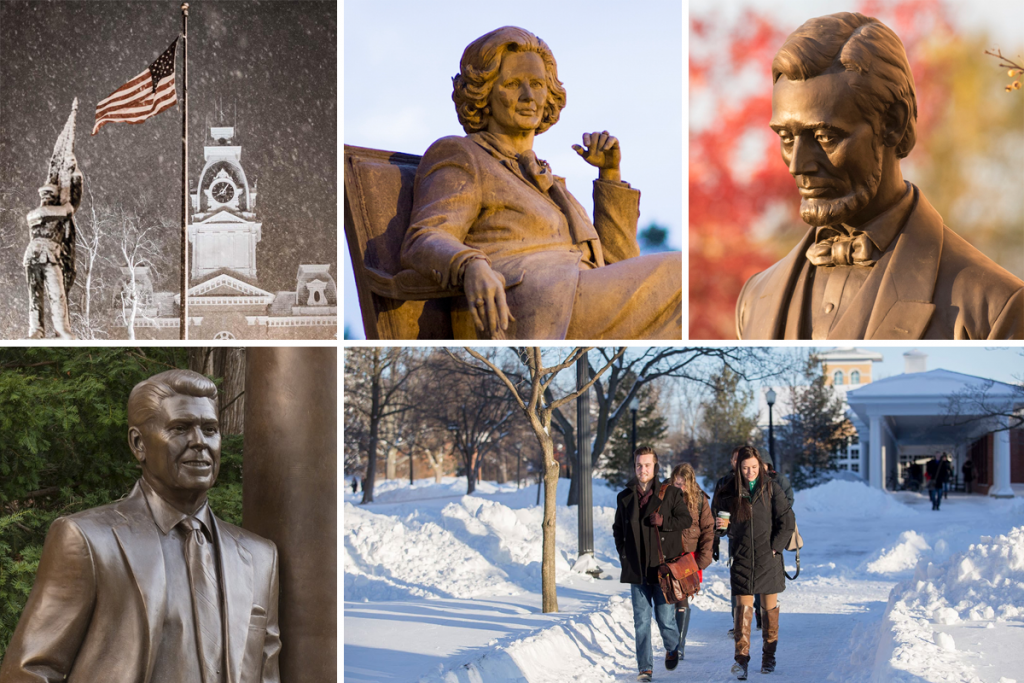
Quick: Name a college with statues of not only Abraham Lincoln but also Ronald Reagan and Margaret Thatcher.
Or one with free online courses that teach the U.S. Constitution? That refuses to accept federal funding.
It can only be one: Hillsdale College, the so-called “shining city on the hill” for political conservatives, who unabashedly revere the founding fathers and don’t apologize for a core curriculum that revolves around books by so-called Dead White Men.
Tucked away in central Michigan, the school is attracting attention yet again in the first few weeks of President Donald J. Trump’s administration. The New York Times and others are shining a light on the Michigan jewel in part because it underscores the debate within conservative intellectual circles about what to make of Trump.
Proudly different, Hillsdale attracts students from throughout the country because it provides world-class education at a bargain. Even though it eschews federal money — making students ineligible for Pell grants — 95 percent of its students received grants of more than $17,000 this year, dramatically lowering its advertised $35,000 cost of tuition, room and board.
The education is without parallel. Unlike other schools that seem ashamed of teaching liberal arts, Hillsdale embraces it. For two years, students study the classics, taking more than a dozen mandatory classes on topics from western heritage, American heritage, biology and chemistry.
The classes help students forge tight bonds with faculty and administrators. Heck, the New York Times noted the school president, Larry P. Arnn, “has been known to swoop down on hapless victims in the cafeteria and pose the core question of the Classics: “What is The Good?”
Is it for everyone? Perhaps not. But what makes Hillsdale awesome is that, in this day of trying to please everyone, it’s proudly unique and charts its own path.
That’s something of a specialty at Hillsdale College and Michigan’s 15 independent colleges and universities.
Proudly small, their students don’t get lost in the crowd like those at big state schools. And unlike public universities, students actually graduate in four years, not only saving a year of tuition but also giving them an extra year of earnings in their careers.
They have a deep and committed network of alumni who help after graduation. It’s an experience that simply isn’t available at traditional universities.
Be bold. Be different. Go independent.
Study Proves Affordability of Michigan Private Colleges
You’ve probably heard it a million times. Private education is elite because only the elites can afford it.
The myth doesn’t come from nowhere. On average, advertised tuition at private colleges often exceeds public ones. But that doesn’t into account massive amounts of aid that lowers actual costs and decades of recruitment efforts that make world-class education affordable to everyone.
Now, there’s a new study that proves the point yet again. Far more students from lower-income families attend Michigan’s top 15 independent colleges and universities than wealthy ones, according to a nationwide study that tracked income and attendance records of more than 30 million students.
At schools such as Olivet College, Siena Heights University, Spring Arbor University, more than 40 percent of the student body comes from families making $65,000 or less per year.
It’s a third or more of the student body at Adrian College, Aquinas College and Andrews University; one quarter at Alma College, Madonna University, University of Detroit-Mercy and Albion College and more than 15 percent at Calvin College, Hope College and Kalamazoo College, the study found.
And the notion that it’s just Richie Riches at private schools? False again. Students from families in the top 1 percent of income ($630,000 or more) comprise a vast minority at Michigan’s private colleges – usually 1-3 percent or less.
We know that’s a lot of numbers. But the point is a world-class private education is within reach.
Students at Michigan’s top 15 independent colleges and universities receive far more financial aid, on average, than counterparts at public institutions. At most of our schools, more than 93 percent receive aid, vastly reducing advertised tuition and making it as affordable — or more so — than big state schools.
And unlike public universities, students at Michigan independents actually graduate in four years, giving them a head start on their career — and extra salary — over their public peers.
Purposefully smaller, Michigan’s private colleges offer a vastly different experience. Classes are small. Award-winning professors actually teach class — rather than TAs — get to know students and help them chart their own path to rewarding careers.
And students immediately are part of a network of alumni who are leaders in their fields. That’s because community, not crowds, are cherished.
Be bold. Be different. Go independent.
Kalamazoo Promise Makes Private Education Within Reach
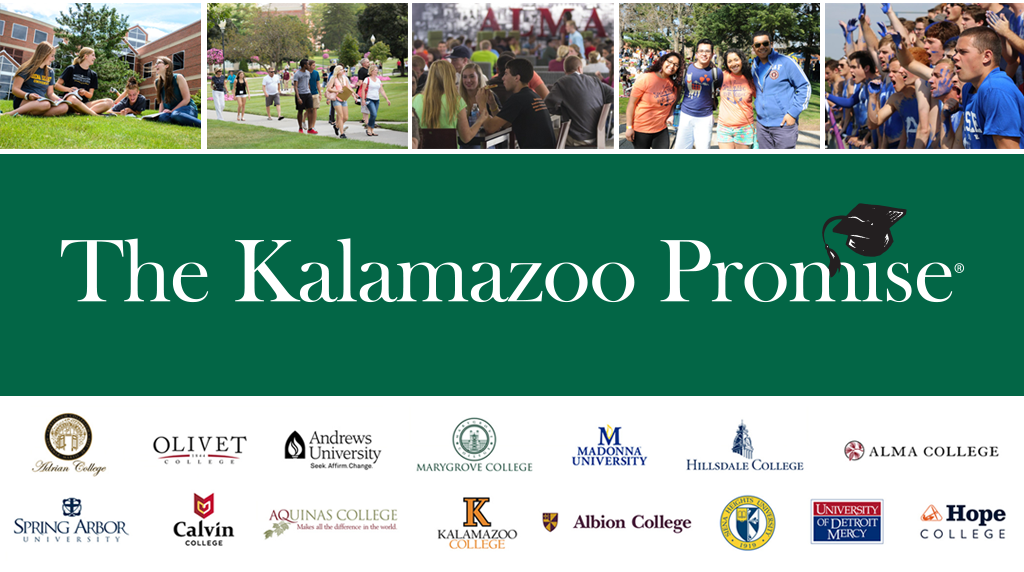
Almost everyone nowadays can cite scary statistics when it comes to the cost of college education.
Nationwide, the average annual tuition at private schools has more than tripled in 30 years jumping to $32,405 this year, according to inflation-adjusted statistics from the College Board.
But the cost of an elite private school education is nothing for students in Kalamazoo public schools.
You read that right.
The cost of Michigan’s 15 independent colleges and universities is zero for students who graduated from Kalamazoo Public Schools and attended since kindergarten. Graduates who attended since at least seventh grade will receive 75 percent of their tuition.
The Kalamazoo Promise is a revolutionary program that is changing lives and putting college in reach for 5,000 eligible graduates since it was launched and funded by anonymous donors in 2005.
The schools now send 85 percent of students to college, whose graduates can expect to earn $1 million more over their lifetime than peers whose education stopped at high school.
And what an education they can get, especially at Michigan’s independents: Adrian College, Albion College, Alma College, Aquinas College, Calvin College, Hillsdale College, Hope College, Kalamazoo College, Marygrove College, Olivet College, the University of Detroit Mercy, Andrews University, Madonna University, Siena Heights University and Spring Arbor University.
The schools pride themselves on helping students forge their own path. Classes are taught by professors, not teaching assistants, with average class sizes of just 17.5 students.
The independents open doors to a host of careers, from business and engineering to education and nursing, supported by a nurturing network of alumni who have become leaders in their fields.
And the independent colleges look like the world around them. One in 4 students at Michigan private colleges and universities is African American, American Indian, Asian, Hispanic or Latino.
Be bold. Be different. Go independent.
Spring Arbor University Offers Scholarship to Help Homeless Man Fulfill Dreams
It’s a story straight out of Hollywood, by way of the Internet.
A Florida tourist takes a video of a homeless man playing Styx’s “Come Sail Away.” It’s breathtakingly beautiful. She puts it on Facebook. The Internet eats it up: In less than a month, the video has 12 million views on YouTube.
Now, Spring Arbor University is reaching out to the bearded mystery man to help him fulfill his dreams. The Michigan school is offering a full-ride music education scholarship, a gift worth $30,000 or more.
It turns out the homeless man, Donald Gould, 51, was a student at Spring Arbor in the 1990s. He was three credits shy of graduating when he dropped out, got married and watched his life fall apart.
First, his wife died in 1998. Then, he turned to substance abuse. So Social Services took away his son. Homelessness followed. His love of music never wavered.
As the story went viral, Spring Arbor officials got together. They knew what they had to do.
“Offering him the scholarship was an easy decision for us to make because of who we are,” Malachi Crane, vice president for enrollment and marketing at SAU, told USA Today.
“We have seen countless students and lives impacted by the transformational education we provide and know that Donald has a unique gift for music that he can use to change lives.”
The scholarship, quite simply, is “the right thing to do,” Crane said. But before Gould re-enrolls, he’s working on his sobriety and getting off the streets.
“He can complete his degree at a time in which he is ready,” Crane said, adding that Gould is getting help to stay on “the right path.”
The benevolence is typical of Michigan’s top 15 independent colleges and universities. Because helping students follow the right path and fulfill their passion is what they do.
All emphasize community over crowds and a spirit of togetherness and cohesion that just doesn’t exist at big state schools. With low class sizes and award-winning faculty, the schools are proud that students forge lifelong bonds with professors.
Often less expensive than public institutions, the independents boast higher four-year graduation rates for a truly unique and affordable experience.
Be bold. Be different. Go independent.
Pure love of sports fuels student athletes in Division III
It’s no secret college sports are big business. College football alone recorded more than $3.4 billion. That’s a hair less than the gross domestic product of the entire nation of Barbados.
It’s little wonder, then, that many folks are cynical about college sports. Some athletes don’t even pretend to be students. There’s one controversy after another, from recruiting and pay-to-play violations to players leaving after a few seasons for the pros.
There is a place, though, where college athletics are untainted. It’s Division III, some 440 colleges and universities nationwide where competition and tradition are just as fierce as bigger universities, but student athletes play for a novel motivation: The love of the game.
“Division III athletics is the purest form of intercollegiate competition,” according to Psychology Today.
“Student-athletes are truly students first. Players are talented, competitive, and driven, but also know that they are in school to pursue an education, prepare for a career, and to develop socially, physically, spiritually, and intellectually.”
NCAA regulations bar student-athletes from receiving athletic scholarships, but that doesn’t mean they don’t receive help. Division III colleges offer grants and other financial aid packages, so students often end up with a large portion of their tuition paid.
That’s particularly true at Michigan’s top 15 independent colleges and universities, where more than 95 percent of students receive aid – from leadership scholarships to academic fellowships to educational grants. That brings the costs of a world-class college within reach — a priceless education that is affordable.
And the rivalries, talent and level of competition at Division III? That’s the stuff of legend, especially among the seven Michigan colleges in the Michigan Intercollegiate Athletic Association.
Since 1990, the schools have won 18 Division III national titles. And few streaks in all of sports are as impressive as the Kalamazoo College men’s tennis team, which has won or shared every division championship since 1936, while Calvin College’s men’s cross country has won 21 straight division titles.
Calvin College and Hope College are such bitter foes that ESPN recently named it one of college basketball’s greatest rivalries. Kalamazoo College and Olivet College also have a deep rivalry that dates back decades.
College athletics is just one difference between big public institutions and Michigan’s top 15 independent colleges and universities.
All share a commitment to helping students succeed by following their own path. The colleges are smaller and emphasize community over crowds. Often less expensive than public institutions, the independents boast higher four-year graduation rates and smaller class sizes for a truly unique and affordable experience.
Be bold. Be different. Go independent.
Military Friendly Schools in Michigan
As a veteran, you forged your own path, so people could have the freedom to choose theirs.
Now, as you chart your next step, the choices can become confusing. Plenty of benefits are available to help veterans attend colleges, but where should you begin? What separates one college from another? And do they all understand the unique perspectives of veterans?
Fortunately, there’s help. Michigan’s top 15 independent colleges and universities are all rated “Military Friendly Schools” by the Web site GIJobs.com. In fact, two are rated in the Top Five nationwide as “Best Colleges for Veterans” by U.S. News and World Report.
Hillsdale College is ranked No. 1 among smaller colleges, while Albion College was No. 4. Both offer full-ride scholarships and plenty of support to veterans.
So do most of Michigan’s independents, which recognize the importance of your sacrifice and make accommodations from mentoring programs and support services to ease the transition.
The colleges are purposefully small. Smaller class sizes allow passionate faculty to form bonds with students that just aren’t possible at larger universities. Instead of crowds, the colleges emphasize community. Often less expensive than public institutions, the independents boast higher four-year graduation rates and smaller class sizes for a truly unique and affordable experience.
Be bold. Be different. Go independent.
Links to Veterans Programs at Michigan’s top 15 independent colleges and universities:
- Adrian College Veterans Programs
- Albion College Veterans Programs
- Alma College Veterans Programs
- Andrews University Veterans Programs
- Aquinas College Veterans Programs
- Calvin College Veterans Programs
- Hillsdale College Veterans Programs
- Hope College Veterans Programs
- Kalamazoo College Veterans Programs
- Madonna University Veterans Programs
- Marygrove College Veterans Programs
- Olivet College Veterans Programs
- Siena Heights University Veterans Programs
- Spring Arbor University Veterans Programs
- University of Detroit Mercy Veterans Programs


